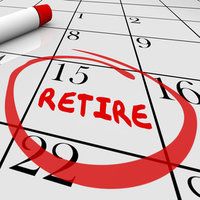Should You Set a Retirement Date?
Setting a date for your retirement -- even if it's far off -- can help you realistically plan for your future.

Many of the financial planning articles on
Dentist’s Money Digest
talk about planning for retirement in the abstract. There is a good reason for this: few dentists know exactly when they will retire. This is true for many people in many professions, of course, but it can be especially true for dentists, who often will rely on the sale of a practice as a major portion of their retirement income.
But if you’re within five to 10 years of retirement, it may be worth it for you to consider setting an actual date by which you plan to retire. Even if you don’t actually retire on that date, setting a specific day in a specific month in a specific year can help you make the final push you’ll need to save and invest for your future.
The Fuzzy Future
As with all future planning, having a vague idea of what you’re trying to accomplish may lead to a very fluid saving and investing strategy. For example, many people think, “When I get closer to retirement, I’ll really crank up my investments.” But keeping the retirement date vague means keeping the goal of ramping up your investments vague. Consider also that for many dentists, the ages between 50 and 60 bring some larger than normal expenses, such as paying for a child’s college education or helping a dependent on a first-time mortgage.
Now let’s go back a few years earlier, and say that you’re in your early 40s. That retirement date seems even farther off, and therefore less of an immediate savings concern. You may catch yourself thinking: “My retirement is two decades from now. I’ll have plenty of time later.”
In your 30s, you may still be paying off dental school debt, establishing your own practice purchase plans, and looking into buying a house. Surely, now, with your income not yet at its peak and your expenses very high, isn’t the right time to save for an indeterminate period that’s more than three decades away.
Pick a Date, Any Date
Setting a retirement date is easy, because it won’t be set in stone. I’m not sure a single person in the history of the world has chosen a specific retirement date in their 30s and then
actually retired
on that date. The idea is simply to have a specific goal in mind, because doing so will make it much easier to establish workable savings goals and stick to them.
Math is, by its nature, objective. Knowing your retirement date, and then knowing your savings goal, allows you to determine exactly what you’ll need to set aside each month in order to be able to retire comfortably. Setting your date allows you to picture very specifically what retiring then should mean for your investing goals now.
ACTIVA BioACTIVE Bulk Flow Marks Pulpdent’s First Major Product Release in 4 Years
December 12th 2024Next-generation bulk-fill dental restorative raises the standard of care for bulk-fill procedures by providing natural remineralization support, while also overcoming current bulk-fill limitations.